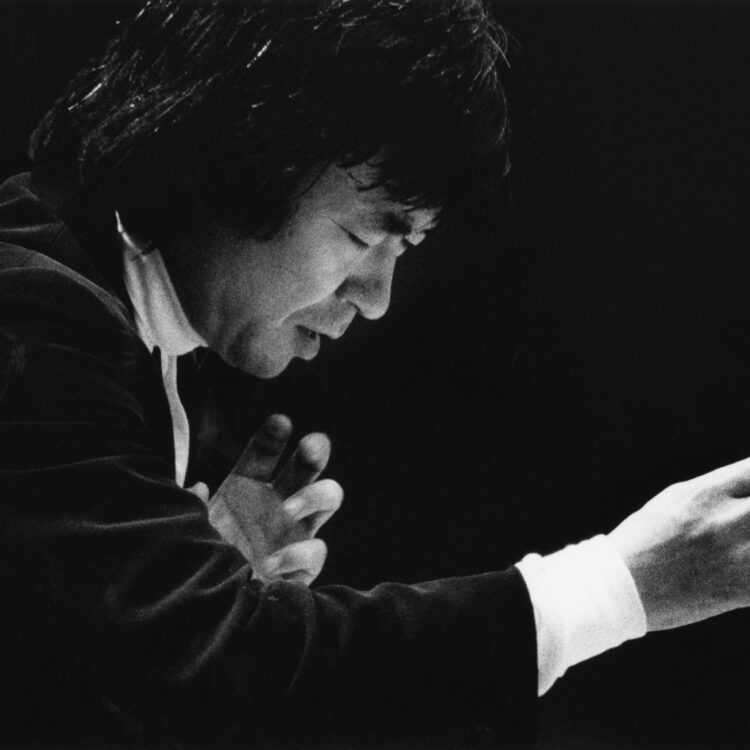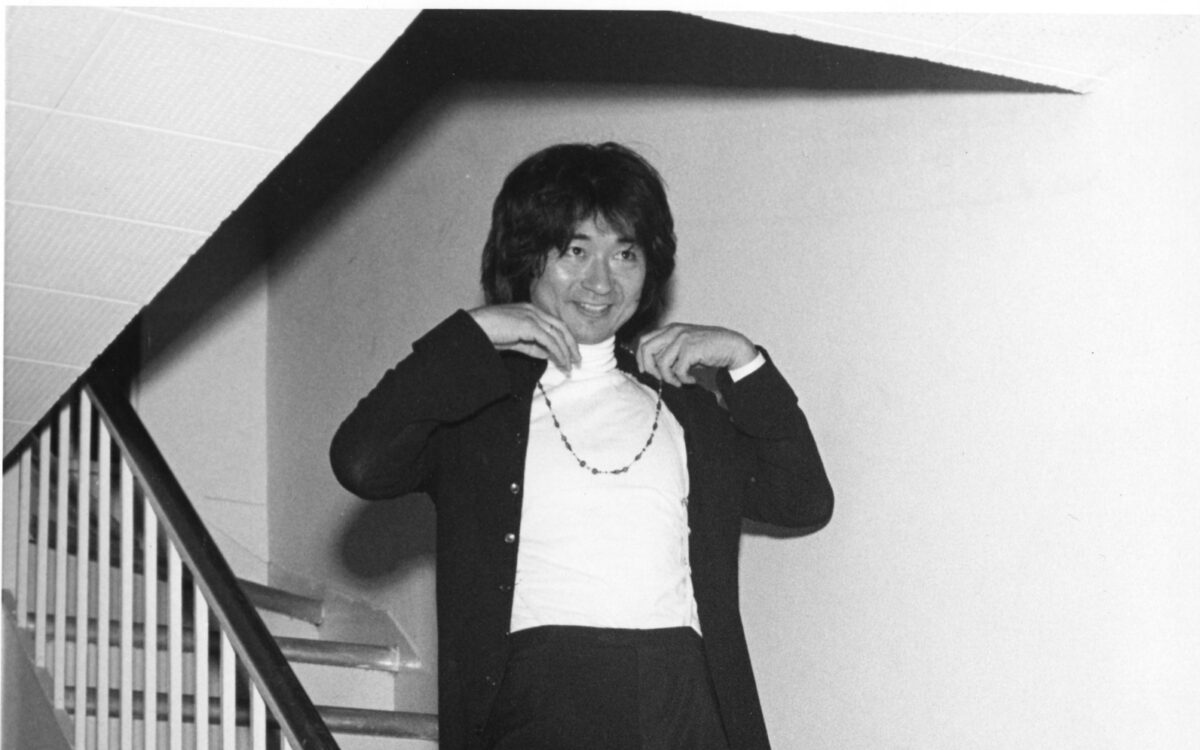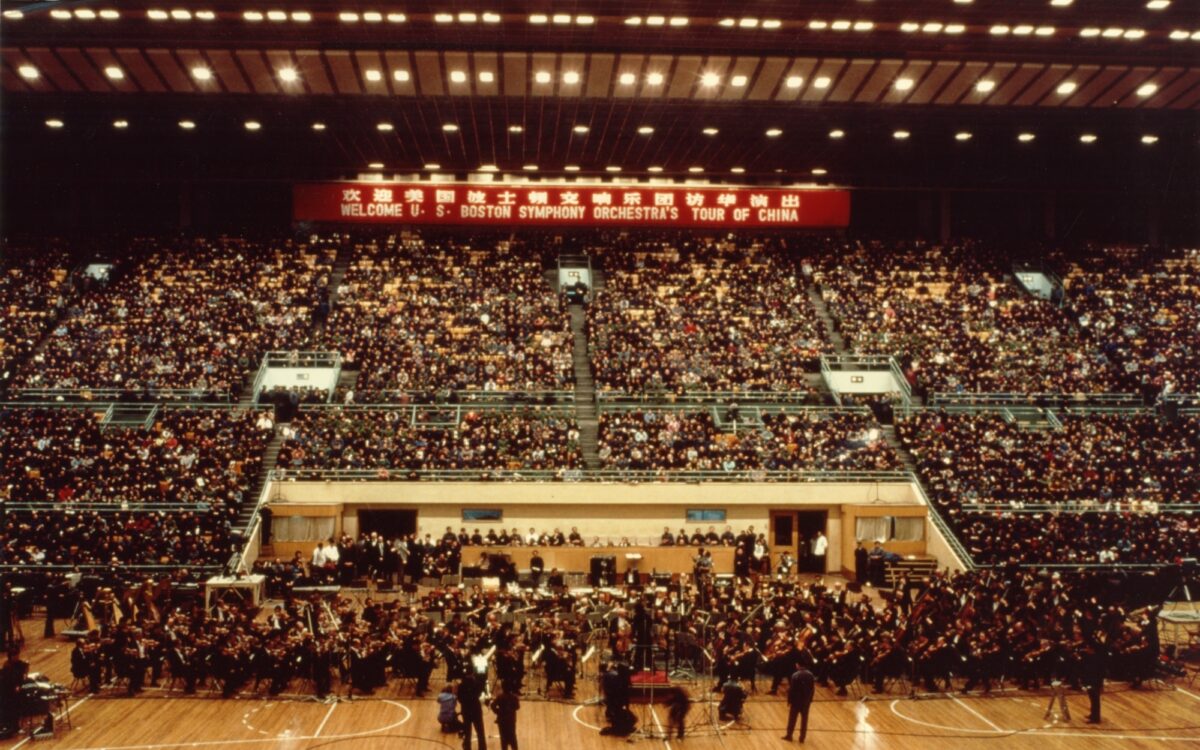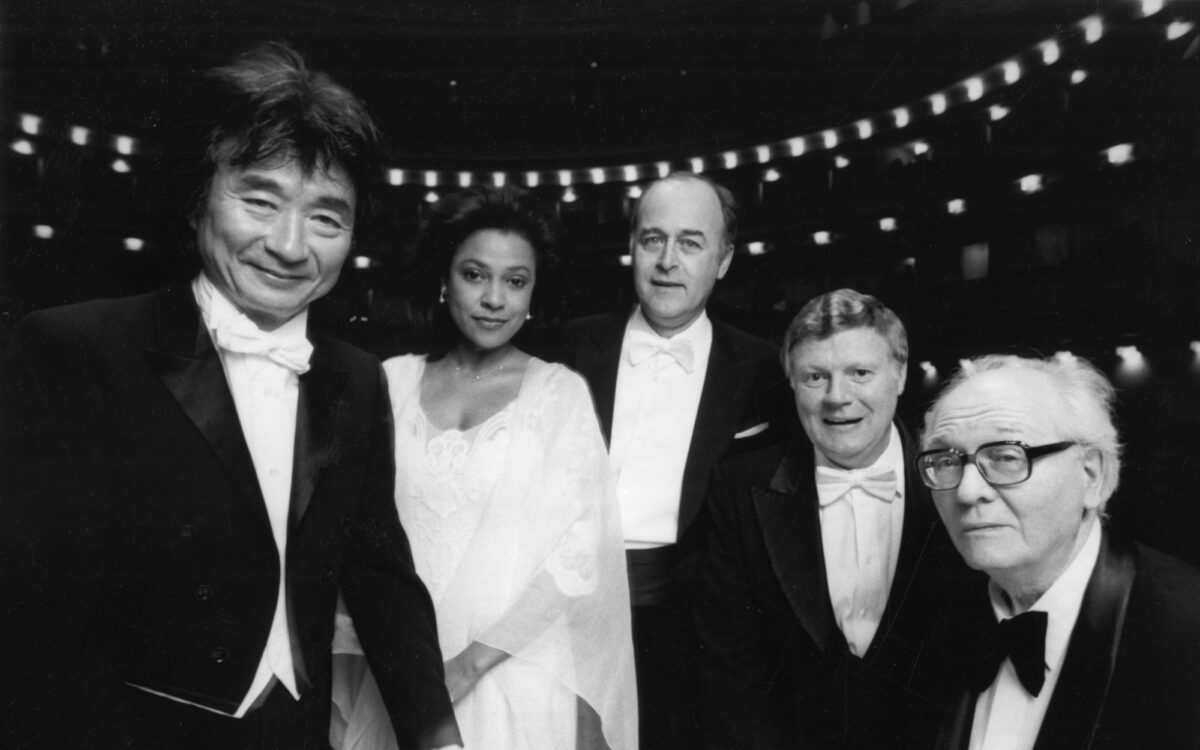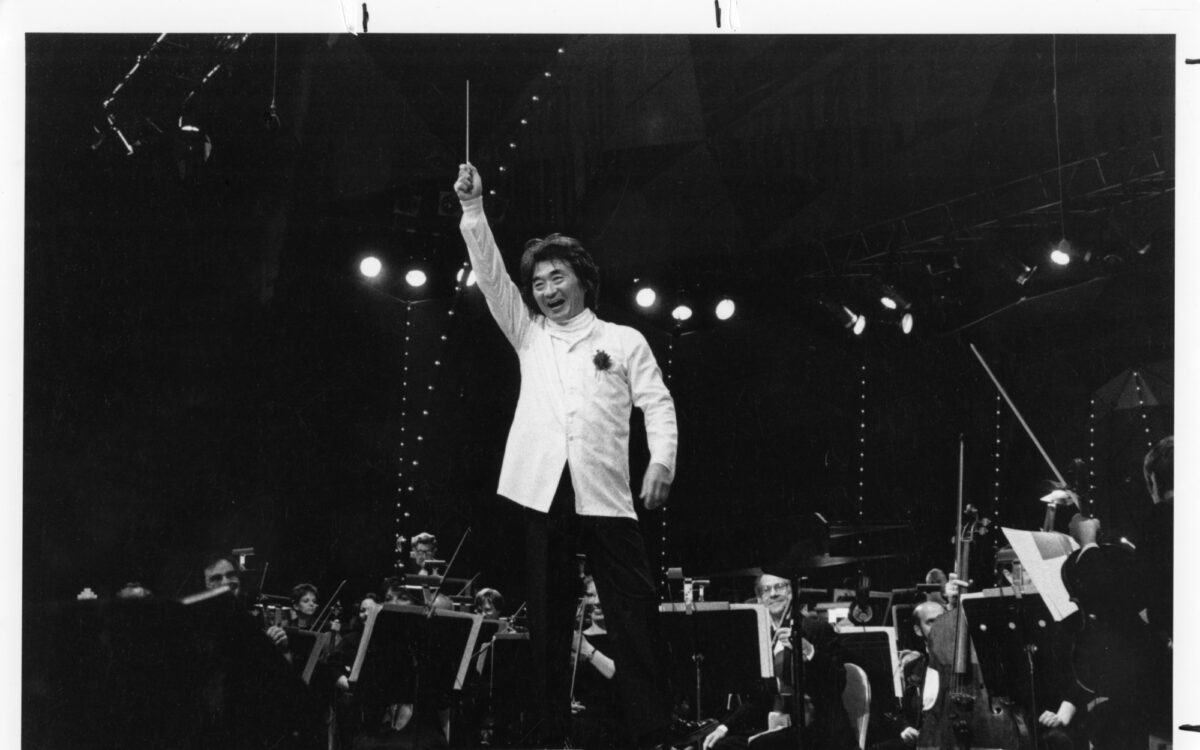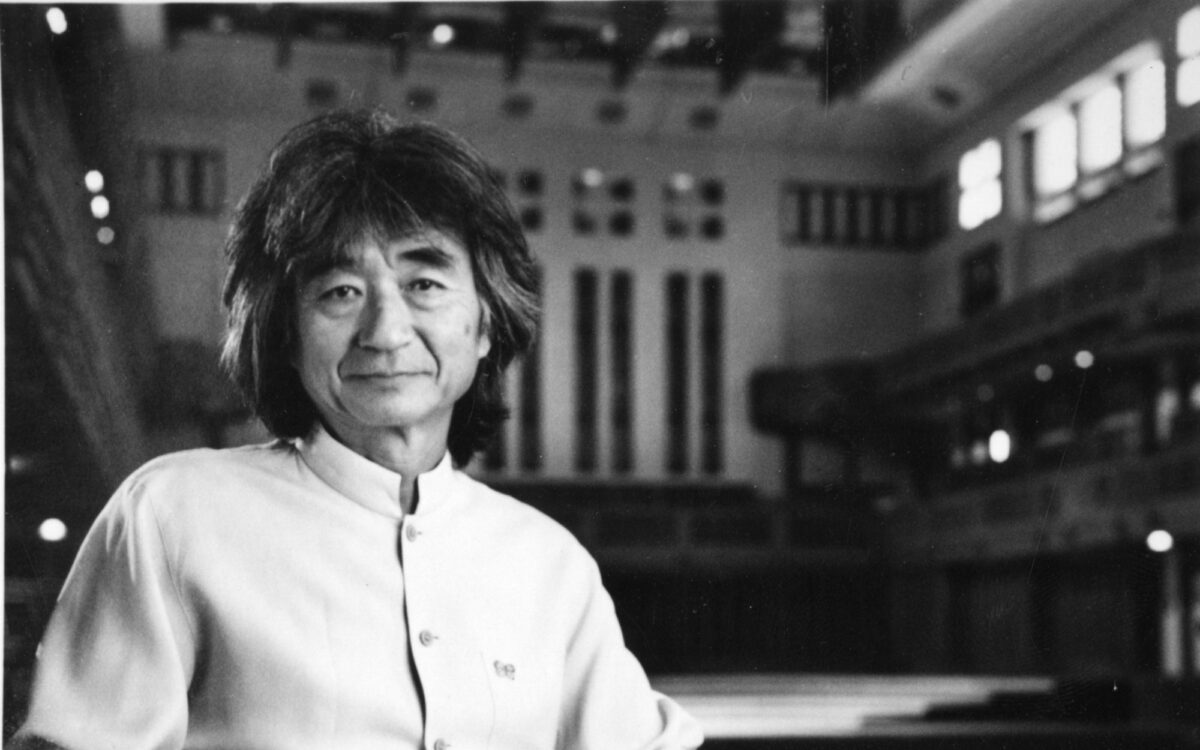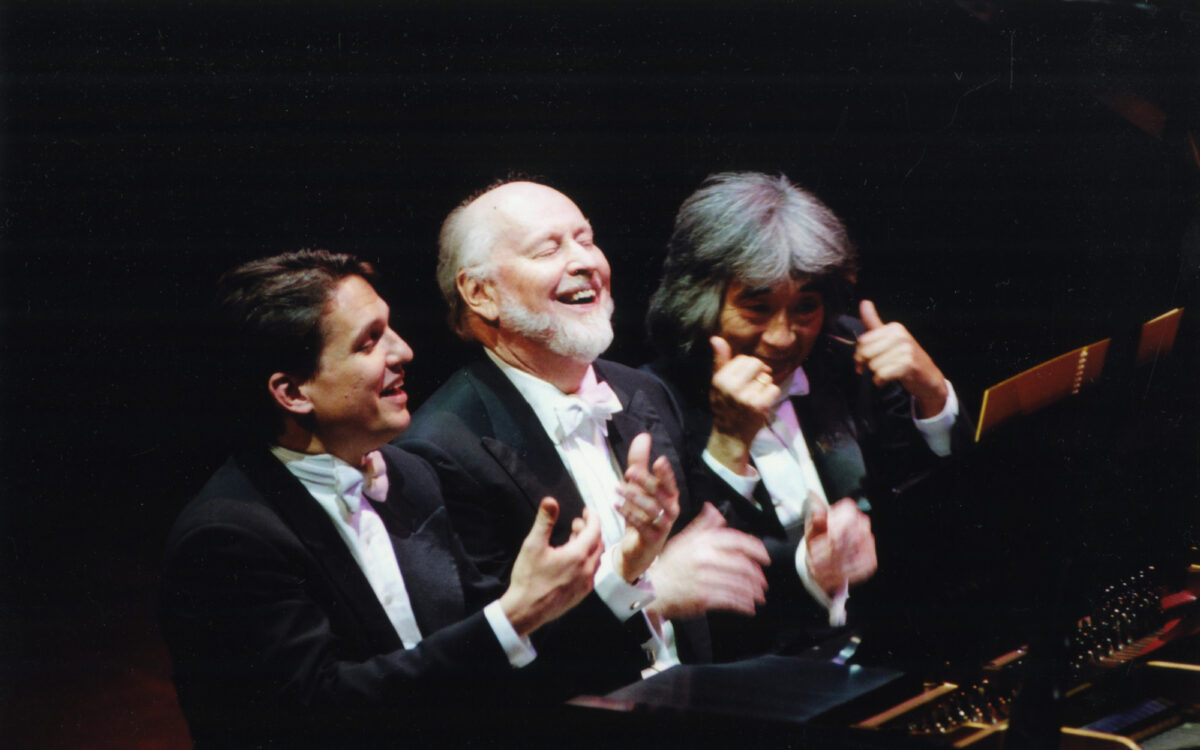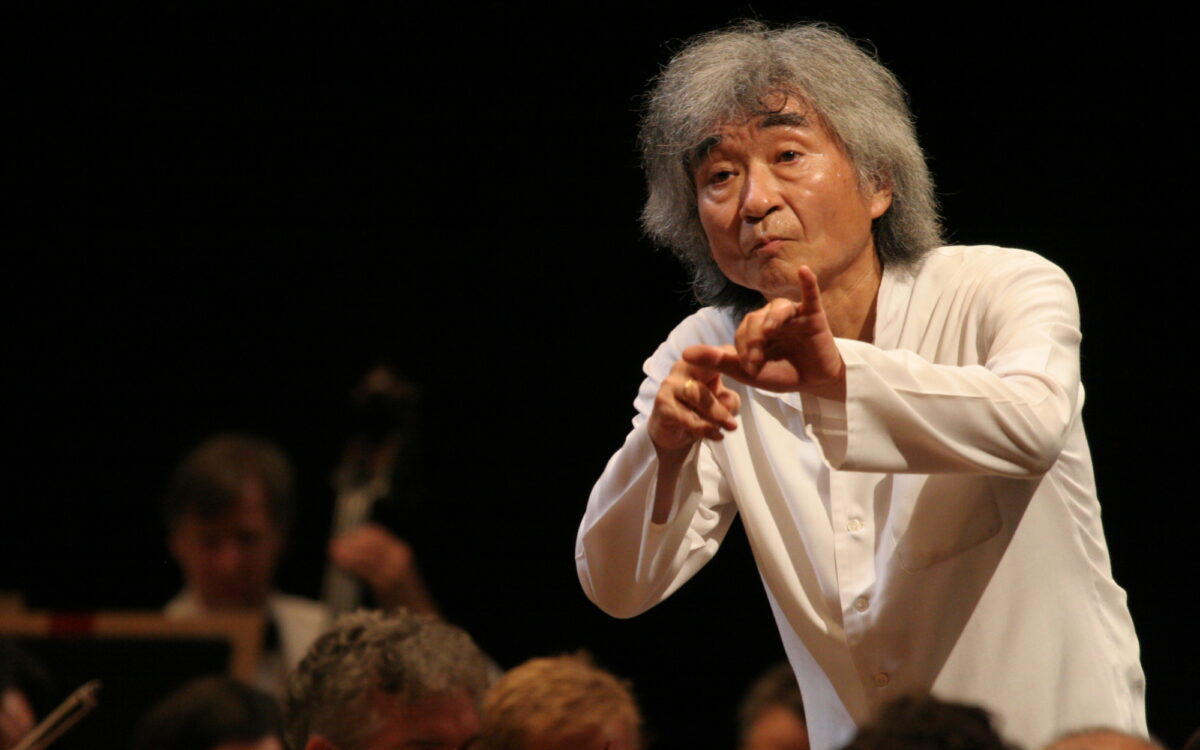A Timeline of Seiji Ozawa with the BSO
-
1935
Born September 1 to Japanese parents in Shenyang, China.
-
1951
Enters the Toho School of Music in Tokyo at the age of 16.
-
1954
First conducts the NHK Symphony Orchestra and the Japan Philharmonic Orchestra.
-
1958
Wins first prizes in both conducting and composition at the Toho School and was designated “outstanding talent” in Japanese music by the NHK and the Friends of Music Magazine.
-
1959
After winning first prize at the Besançon International Competition for Young Conductors, Seiji Ozawa is invited by then-BSO music director Charles Munch to study at Tanglewood. Soon thereafter he hears Munch and the Boston Symphony Orchestra for the first time during the orchestra’s first-ever tour to Japan.
-
1960
Berkshire Music Center
Seiji Ozawa arrives at the Berkshire Music Center (now the Tanglewood Music Center), the Boston Symphony’s summer training academy at Tanglewood, works with BSO Music Director Charles Munch and conducting instructor Eleazar de Carvalho; this marks the beginning of his long association with the Boston Symphony Orchestra. At the end of that summer, he is awarded the Koussevitzky Prize for Outstanding Student Conductor.
Assistant to Herbert von Karajan in Berlin.
-
1961
Assistant to Leonard Bernstein at New York Philharmonic, starting with tour of Japan.
-
1962
First professional conducting job in North America at the San Francisco Symphony.
-
1964
![Seijis BSO debut at TWD Whitestone 1964]()
Seiji Ozawa's debut conducting the BSO took place on August 16, 1964 at Tanglewood.
(Heinz Weissenstein/Whitestone Photos)
Seiji Ozawa makes his first guest conducting appearance with the Boston Symphony Orchestra on August 16 at Tanglewood. The program includes Bizet’s Symphony in C, Hindemith’s Mathis der Maler, and Mussorgsky’s Pictures at an Exhibition. He makes encore appearances during the 1965, 1966, and 1967 summer seasons.
Appointed artistic director of Chicago Symphony Orchestra’s Ravinia Festival.
-
1965
Appointed music director of Toronto Symphony Orchestra.
-
1968
Symphony Hall Debut
Seiji Ozawa leads his first BSO concert in Symphony Hall on January 26. The program includes music of Gluck and Joachim, as well as Bernstein’s Symphony No. 2, Age of Anxiety, and Ravel’s second suite from Daphnis et Chloé. The following week he brings the same program to Hartford, New York, and Brooklyn.
-
1969
As guest conductor, Seiji Ozawa makes his first recordings with the Boston Symphony Orchestra at Symphony Hall of Orff’s Carmina burana, Stravinsky’s Petrushka, and the suite from Stravinsky’s The Firebird for the RCA Victor label.
-
1970
![Gunther Schuller, Leonard Bernstein, and Seiji Ozawa at Tanglewood, 1970]()
Gunther Schuller, Leonard Bernstein, and Seiji Ozawa at Tanglewood, 1970
(Heinz Weissenstein/Whitestone Photo)
Seiji Ozawa is appointed an artistic adviser for the BSO at Tanglewood, alongside Gunther Schuller as head of the Tanglewood Music Center and Leonard Bernstein as general adviser.
Appointed music director of San Francisco Symphony.
-
1972
In February, Seiji Ozawa is appointed music adviser for the Boston Symphony Orchestra’s 1972-73 season and music director starting with the 1973-74 season.
-
1973
![Seiji Ozawa descends the stairs backstage at Symphony Hall wearing his signature beads, 1973]()
Seiji Ozawa descends the stairs backstage at Symphony Hall wearing his signature beads, 1973
(Photography, Inc.)
First Program as Music Director
At age 38, Seiji Ozawa conducts his first program as 13th music director of the Boston Symphony Orchestra with Berlioz’ The Damnation of Faust on September 28; two weeks later he makes his Carnegie Hall debut with the BSO with the same piece. The same work is recorded for Deutsche Grammophon, marking the first recording for Seiji Ozawa as music director, as well as the first Grammy nomination.
-
1974
“Evening at Symphony,” the orchestra’s televised concert series produced by WGBH-TV for national broadcast on PBS, is launched. The series earns Seiji Ozawa an Emmy for outstanding achievement in musical direction in 1976.
-
1975
Seiji Ozawa makes his first United States tour with the Boston Symphony Orchestra, performing in Detroit, Ann Arbor (Mich.), Indianapolis, Bloomington (Ind.), Chicago, Wheaton (Ill.), and Iowa City.
-
1976
Seiji Ozawa makes his first international tour with the Boston Symphony Orchestra, playing to audiences in Amsterdam, Brussels, Vienna, Linz, Munich, Berlin, Hamburg, London, Bonn, Hannover, and Paris.
-
1977
Seiji Ozawa and the BSO’s recording of Berlioz’ Romeo and Juliet on Deutsche Grammophon is awarded the Grand Prix du Disque.
-
1978
Seiji Ozawa and the BSO travel to Japan for the first time together, with concerts in Fukuoka, Kokura, Hiroshima, Osaka, Kyoto, Anazawa, Nagoya, Yokohama, and Tokyo. It is the BSO’s second-ever tour to Japan, the first having been led by Charles Munch in 1960.
-
1979
![Seiji Ozawa leads members of the BSO and the Central Philharmonic Orchestra of China, March 13, 1979, at Peking's Capital Stadium]()
Seiji Ozawa leads members of the BSO and the Central Philharmonic Orchestra of China, March 13, 1979, at Peking's Capital Stadium.
(Story Litchfield)
China Tour
Seiji Ozawa and the Boston Symphony Orchestra make history as the first western orchestra to perform in China following the establishment of diplomatic relations, with concerts, coachings, and master classes in Shanghai and Beijing.
-
1980
“The Boston Goes to China,” the CBS documentary about the BSO’s historic visit to China, is awarded four Emmys for best documentary, best direction, best editing, and best sound.
Seiji Ozawa leads a performance of Puccini’s Tosca at Tanglewood, initiating a series of semi-staged operas under his direction at Tanglewood and in Symphony Hall that will continue with performances of Puccini’s Madama Butterfly during his 25th Anniversary Season at Symphony Hall.
Appointed honorary artistic director of the New Japan Philharmonic.
-
1981
Seiji Ozawa and the BSO celebrate the orchestra’s centennial with a gala concert on October 18 featuring violinists Itzhak Perlman and Isaac Stern, soprano Leontyne Price, cellist Mstislav Rostropovich, and pianist Rudolf Serkin. A free "100th Birthday Concert" featuring Beethoven’s Ninth Symphony is performed on Boston Common on October 22. The year also includes two centennial tours, one across the United States in March and the other to Japan and Europe in October and November.
In all, 12 works are commissioned for the orchestra’s centennial, including works for the BSO, for the Boston Pops, for the Boston Symphony Chamber Players, and the Tanglewood Festival Chorus. World premieres of a number of these works are given during this season, including Leonard Bernstein’s Divertimento for Orchestra (1980), Peter Maxwell Davies’ Symphony No. 2, and Roger Sessions’ Concerto for Orchestra, which earns him the 1982 Pulitzer Prize in musical composition.
-
1982
A recording of Beethoven’s Emperor Piano Concerto with Rudolf Serkin and the BSO led by Seiji Ozawa is released on the Telarc label, inaugurating their cycle of the composer’s piano concertos.
-
1983
Seiji Ozawa and the BSO celebrate 10 years together with a tour of the United States, including performances in Ann Arbor (Mich.); Cleveland, Columbus, and Cincinnati (Ohio); and Lexington (Ky.).
-
1984
Founding of Saito Kinen Orchestra
Seiji Ozawa and the BSO perform their first semi-staged opera in Symphony Hall of Arthur Honegger’s dramatic oratorio Jeanne d’Arc au bûcher. The following week, the same production is given at Carnegie Hall; the New York Times names it one of the best musical events of the year.
Working with Kazuyoshi Akiyama, Ozawa co-founds the Saito Kinen Orchestra to commemorate the 10th anniversary of the death of Hideo Saito.
-
1985
50th Birthday Celebration
The BSO marks Seiji Ozawa’s 50th birthday at Tanglewood on September 1 with special guest Itzhak Perlman — who celebrated his 40th one day earlier — in an all-Beethoven concert drawing an audience of 17,734, a record at that time.
-
1986
![Seiji Ozawa, Kathleen Battle, José van Dam, Kenneth Riegel, and Olivier Messiaen, April 1986]()
Seiji Ozawa, Kathleen Battle, José van Dam, Kenneth Riegel, and Olivier Messiaen at Carnegie Hall, April 1986
(Karen Kuehn)
Seiji Ozawa leads the BSO in the American premiere of three scenes from Olivier Messiaen’s monumental opera St. Francis of Assisi in Boston, followed by performances in New York’s Carnegie Hall. Bass-baritone José van Dam, tenor Kenneth Riegel, and soprano Kathleen Battle are soloists, with the Tanglewood Festival Chorus and conductor John Oliver.
-
1987
Seiji Ozawa and the BSO present acclaimed performances of Strauss’ Elektra with Hildegard Behrens in the title role and Christa Ludwig as Klytemnestra. The production is repeated the following year and recorded by Philips, marking Ozawa’s first opera recording with the BSO.
“Ozawa,” the highly-acclaimed 1985 documentary on Ozawa by leading American filmmakers Albert and David Maysles, airs on PBS’ “Great Performances,” and is subsequently released on home video.
-
1988
![Seiji Ozawa conducting during the Bernstein at 70 concert]()
Seiji Ozawa conducting during the Bernstein at 70 concert
(Walter Scott)
Seiji Ozawa and the BSO participate in a gala, star-studded performance at Tanglewood celebrating Leonard Bernstein’s 70th birthday on August 25. “Bernstein at 70!” is broadcast on PBS’ “Great Performances” the following March and wins an Emmy for outstanding classical program in the performing arts.
-
1989
Seiji Ozawa makes his 50th Boston Symphony Orchestra player appointment; some 80% of today’s BSO is still made up of Ozawa appointees.
-
1990
Seiji Ozawa and the BSO’s recording of Strauss’ Elektra is nominated for a Grammy Award and named a record of the year by Stereo Review magazine.
-
1991
The Boston Symphony Orchestra’s first video laserdisc is released on Sony Classical, with Seiji Ozawa leading the orchestra in Brahms’ Symphony No. 1 and Strauss’ Also sprach Zarathustra. The performance was recorded during the orchestra’s 1986 Japan tour.
Ozawa leads the 1,000th BSO concert at Tanglewood, on August 16.
Ozawa and the BSO perform concert stagings of Tchaikovsky’s Pique Dame with soprano Mirella Freni, tenor Vladimir Atlantov, and baritone Dmitri Hvorostovsky in Symphony Hall. The performances are recorded live for RCA Victor, marking a renewed collaboration with this label. The recording is nominated for a Grammy for best opera recording in 1993.
-
1992
Seiji Ozawa leads the BSO on its first tour to South America, performing in São Paulo, Brazil, Buenos Aires, Argentina, and Caracas, Venezuela.
Ozawa conducts his 1,000th concert during the 1991-92 Symphony Hall subscription season. Up to this date, he has led nearly 1,400 concerts with the orchestra in Symphony Hall, at Tanglewood, and throughout the world.
Ozawa founds the Saito Kinen Festival at Matsumoto.
Ozawa makes his Metropolitan Opera debut leading Tchaikovsky’s Eugene Onegin.
-
1993
![Itzhak Perlman, Seiji Ozawa, and Yo-Yo Ma backstage during the BSO's European Tour, December 1993]()
Itzhak Perlman, Seiji Ozawa, and Yo-Yo Ma backstage during the BSO's European Tour, December 1993
(Lincoln Russell)
Seiji Ozawa and the BSO celebrate 20 years together with a special opening night all-Berlioz program featuring soprano Sylvia McNair, mezzo-soprano Frederica von Stade, tenor Jerry Hadley, and baritone Benjamin Luxon. The season also includes a European tour with performances in London, Paris, Madrid, Vienna, Milan, Munich, and Prague.
This year also marks the world premiere of Hans Werner Henze’s Symphony No. 8, commissioned by Ozawa and the BSO.
-
1994
![Seiji Ozawa inside Ozawa Hall, 1998]()
Seiji Ozawa inside Ozawa Hall, 1998
(Lincoln Russell)
Inouye Award & Ozawa Hall
Seiji Ozawa receives his second Emmy Award for individual achievement in cultural programming for the PBS telecast “Dvořák in Prague: A Celebration,” a program produced at the orchestra’s 1993 performance in Prague during that season’s European tour.
A new era begins for the Tanglewood Music Center with the opening of Seiji Ozawa Hall and the Leonard Bernstein Campus.
Ozawa becomes the first recipient of Japan’s Inouye Sho (“Inouye Award”). Created to recognize lifetime achievement in the arts, the award is named after this century’s preeminent Japanese novelist, Yashushi Inouye.
-
1995
Seiji Ozawa and the BSO’s recording of Mahler’s Third and Sixth symphonies is released, completing the full cycle of Mahler symphonies on the Philips label.
Ozawa and the BSO’s recording of Bartók’s Concerto for Orchestra, incorporating the composer’s original ending, is released on the Philips label to mark the 50th anniversary of the premiere of this important BSO commission.
Ozawa, Itzhak Perlman, and Yo-Yo Ma celebrate their 60th, 50th, and 40th birthdays respectively, at a gala concert at Tanglewood entitled “The Three Birthdays,” drawing an audience of 18,709.
Honored on the occasion of his 60th birthday with a special concert at Suntory Hall in Tokyo, Japan. For the occasion the New Japan Philharmonic was joined by members of the Boston Symphony Orchestra, the Chicago Symphony Orchestra, the Toronto Symphony Orchestra, the San Francisco Symphony, and the Vienna Philharmonic. Among the many guest artists were pianists Martha Argerich and Peter Serkin, cellist Mstislav Rostropovich (who also appeared as conductor), violist Nobuko Imai, singers Frederica von Stade and Benjamin Luxon, and conductor Kazuyoshi Akiyama.
Ozawa and the BSO give the American premiere of Sir Michael Tippett’s The Rose Lake, a joint commission that would be Sir Michael’s final work.
-
1996
Seiji Ozawa and the BSO perform the world premiere of George Walker’s Lilacs, a work commissioned by the BSO for a special tribute to the late African American tenor Roland Hayes; Walker is awarded the Pulitzer Prize for music composition for his work.
-
1997
Seiji Ozawa and the BSO give the world premiere of Henri Dutilleux’s The Shadows of Time, a work commissioned by bOzawa and the BSO. The piece was recorded by Erato in March 1998 for release in Europe when the BSO gives the French premiere in Paris the following week, while the orchestra was on tour in Europe.
-
1998
![Seiji Ozawa in the crowd at the 1998 Winter Olympics in Nagano, Japan]()
Seiji Ozawa in the crowd at the 1998 Winter Olympics in Nagano, Japan
(John Tlumacki)
Winter Olympics & la Légion d’Honneur
Plays a key role in the opening ceremony of the 1998 Winter Olympics in Nagano, Japan, leading the finale of Beethoven’s Ninth Symphony from Japan with choruses positioned around the globe and linked by satellite from Beijing, Berlin, New York City, Sydney, and Capetown, South Africa.
With the opening night concert on September 23, Ozawa surpasses Serge Koussevitzky’s 25-year tenure with the BSO. Koussevitzky led his first concert as music director on October 10, 1924, and his final on August 14, 1949, at Tanglewood.
Ozawa and the BSO celebrate 25 years together with a special Silver Anniversary Season in 1998-99, including a free performance on the Boston Common of Beethoven’s Ninth Symphony, a concert staging of Puccini’s Madama Butterfly, and a tour to Japan.
Also in 1998, named a Chevalier de la Légion d’Honneur by French President Jacques Chirac, recognizing Ozawa’s work not only as a conductor but also his support of French composers, his devotion to the French public, and his work at the Paris Opera.
-
1999
Seiji Ozawa announces acceptance of position of music director at Vienna State Opera and resignation of BSO post following 2002 season.
-
2000
![Keith Lockhart, John Williams, and Seiji Ozawa play the piano during the Symphony Hall Centennial]()
Keith Lockhart, John Williams, and Seiji Ozawa play the piano during the Symphony Hall Centennial, October 2000
(Miro Vintoniv)
In the spring, following the BSO’s 1999-2000 subscription season, Seiji Ozawa leads the orchestra in performances of Mahler’s Resurrection Symphony and Messiaen’s Turangalîla-symphonie in Paris and Cologne. As part of the city of Paris’ Millennium Celebration, Ozawa also leads a first-ever free concert at the foot of the Eiffel Tower featuring the BSO and the Orchestre de Paris, with Italian singer Andrea Bocelli and a chorus of 600 adults and children. The concert is among the biggest free concerts ever to take place in Europe – drawing more than 100,000 Parisians – and is broadcast live throughout France.
Reflecting his strong commitment to the teaching and training of young musicians, Ozawa founds the Ozawa Ongaku-juku (“Ozawa Music Academy”) in Japan, at which aspiring young orchestral musicians collaborate with Ozawa and professional singers in fully-staged opera productions.
In late November, Ozawa leads the Boston Symphony Orchestra in the world premiere of John Corigliano’s Symphony No. 2, a work commissioned by the BSO and much anticipated since the resounding success of the composer’s First Symphony in 1990. The work, for strings only, is based on Corigliano’s 1995 String Quartet. The following spring, it is awarded the 2001 Pulitzer Prize for music.
-
2001
Seiji Ozawa leads the Boston Symphony in a concert performance of Strauss’ opera Salome in August at Tanglewood, featuring a cast of internationally acclaimed soloists including soprano Deborah Voigt in her first-ever performance of the title role. The performance is the highlight of the 2001 Tanglewood season, Ozawa’s last full Tanglewood season as BSO music director.
Marking the 10th anniversary of the Saito Kinen Festival in the Japan Alpine town of Matsumoto, Ozawa leads four performances of Janáček’s opera Jenůfa and an all-Beethoven program by the renowned Saito Kinen Orchestra in late August and early September. The festival also features appearances by the Boys Choir of Harlem, both with the orchestra and in recital, and performances of Bach’s six Brandenburg concertos by members of the Saito Kinen Orchestra.
Ozawa opens his 29th and final season as BSO Music Director on October 2 at Symphony Hall, with a program featuring two of the world’s most acclaimed singers – soprano Dawn Upshaw and mezzo-soprano Susan Graham – joining the orchestra and the women of the Tanglewood Festival Chorus in Mendelssohn’s Incidental Music to A Midsummer Night’s Dream. Tony Award-winning actress Blythe Danner joins Ozawa and the orchestra as guest narrator for this special program, which kicks off the BSO’s 121st season.
-
2002
Final Appearances as BSO Music Director
Ozawa’s final appearances at Symphony Hall as BSO music director take place on April 20, 2002. In the morning he leads the BSO in Berlioz’s Symphonie Fantastique in a free concert entitled “From Seiji, With Thanks,” hosted by John Williams. That evening he leads the BSO in a performance of Mahler’s Symphony No. 9.
July 14, 2002, marks Ozawa’s final performance as BSO music director at Tanglewood. The program includes Berlioz' Symphonie Fantastique; Beethoven's Fantasia in C minor for Piano, Chorus and Orchestra, with mezzo-soprano Zheng Cao and the Tanglewood Festival Chorus; and Randall Thompson’s Alleluia, for a capella chorus.
-
2006
![Seiji Ozawa conducts the BSO in a performance of Mahler's Symphony No. 2 "Resurrection" at Tanglewood, August 5, 2006]()
(Hilary Scott)
Music Director Laureate
Ozawa returns to Tanglewood as the BSO’s music director laureate, leading the BSO in a performance of Mahler’s Resurrection Symphony on August 5, 2006.
-
2008
Ozawa’s leads his final programs with the BSO in Symphony Hall, November 28 and 29, 2008. He chooses a program of all-French music.
-
2009
Seiji Ozawa Music Academy Orchestra debuts at the Saito Kinen Festival.
-
2011
Saito Kinen Festival held in Beijing and Shanghai for the first time.
-
2012
Saito Kinen Festival 20th Anniversary in Japan.
-
2015
Seiji Ozawa Matsumoto Festival & Kennedy Center Honors
Celebrating Seiji at 80! Gala concert, the festival is re-named the Seiji Ozawa Matsumoto Festival.
Named a Kennedy Center Honoree, recognizing the lifelong accomplishments and extraordinary talents of our nation’s most-prestigious artists.
-
2022
For the ONE EARTH MISSION, a joint initiative with the Japanese Aerospace Exploration Agency, Ozawa conducts a live performance of Beethoven Egmont Overture to the International Space Station, the first time in history a live symphonic concert was beamed into space.
A Tribute to Seiji Ozawa
Read More